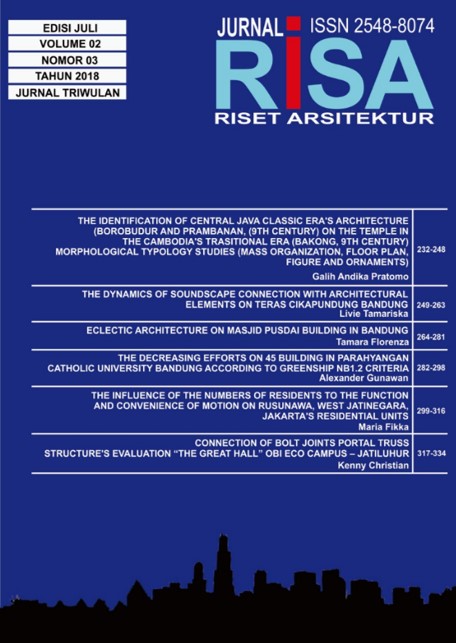THE DYNAMICS OF SOUNDSCAPE CONNECTION WITH ARCHITECTURAL ELEMENTS ON TERAS CIKAPUNDUNG BANDUNG
DOI:
https://doi.org/10.26593/risa.v2i03.2945.249-263Abstrak
Abstract- In architecture of public space, the experience of place plays an important role in the making of the good quality of public spaces. The experience of the space is multi-sensory, so architecture should emphasize its attention also on the architectural space approach through auditory experience. The study was conducted to determine the dynamics connection of soundscape experience and Terrace Cikapundung architecture.
The research method is qualitative and descriptive analysis. Quantitative measurements are made to complement the qualitative data. The analysis is done through questionnaire distribution, field observation, analysis, and by relating it with the study of theories about public space architecture, soundscape, sacred sounds, sense of place, intention of architecture, and perception theory.
In Terrace Cikapundung are found quite a lot of natural sounds, which are considered as sounds that improve the quality of the people spatial experience. The natural sounds that are found there are the sound of birds, wind, and water flow. While the dominant voice heard is the sound of motor vehicle, which is considered as disturbing sound for the audiences in particular “man-made zone” (zone that borders the highway). This indicates that there are some architectural elements that have not been able to work optimally, especially the design of bordering element between the site with the main sound source (Jalan Siliwangi). Furthermore, the concave physical topology and the zonation of “man-made zone” and “natural zone” is well designed, based on the variety characterictic of function, location, and order of architectural elements, that will give us the study and example of spatial making and good experience of place.
Through design that concern in the multi-sensory aspects of experience, especially in auditory experience, the experience of space can be felt thoroughly and the quality of a public space can be increased.
Key Words: soundscape, architectural element, open public space












